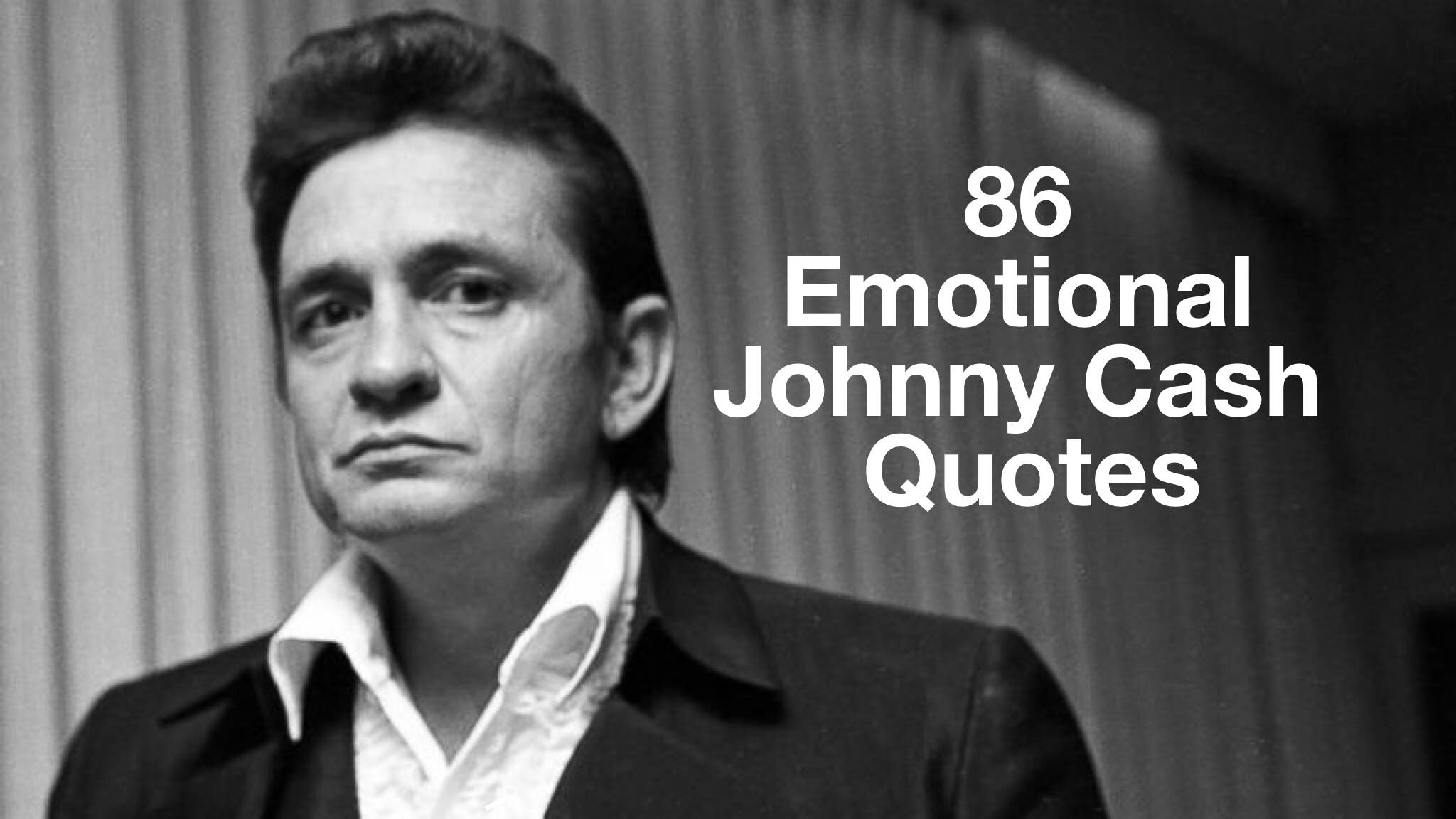

image © Michael Ochs Archives/Getty Images
Johnny Cash was one of the most successful music artists of all time. A country music icon, his songs and his sound embraced many genres, including rock and roll, rockabilly, blues, folk, and gospel. He sold more than 90 million records worldwide.
With his all-black performing wardrobe, the ‘Man in Black’ became famous for his honest and sombre demeanor, free prison concerts, and calming bass-baritone voice. He opened his concerts with a simple “Hello, I’m Johnny Cash,” followed up with his signature song, Folsom Prison Blues.
But great success came at a price.
Cash struggled with addictions to alcohol and drugs, watched his personal life flounder, and spent nights in jails across America. Deep sorrow, moral tribulations, and the need for redemption are common themes found in his music, and they echo a life full of deep feelings and difficult experiences.
In honor of the Man in Black and the lasting legacy of his music, here are 86 of the best Johnny Cash Quotes.
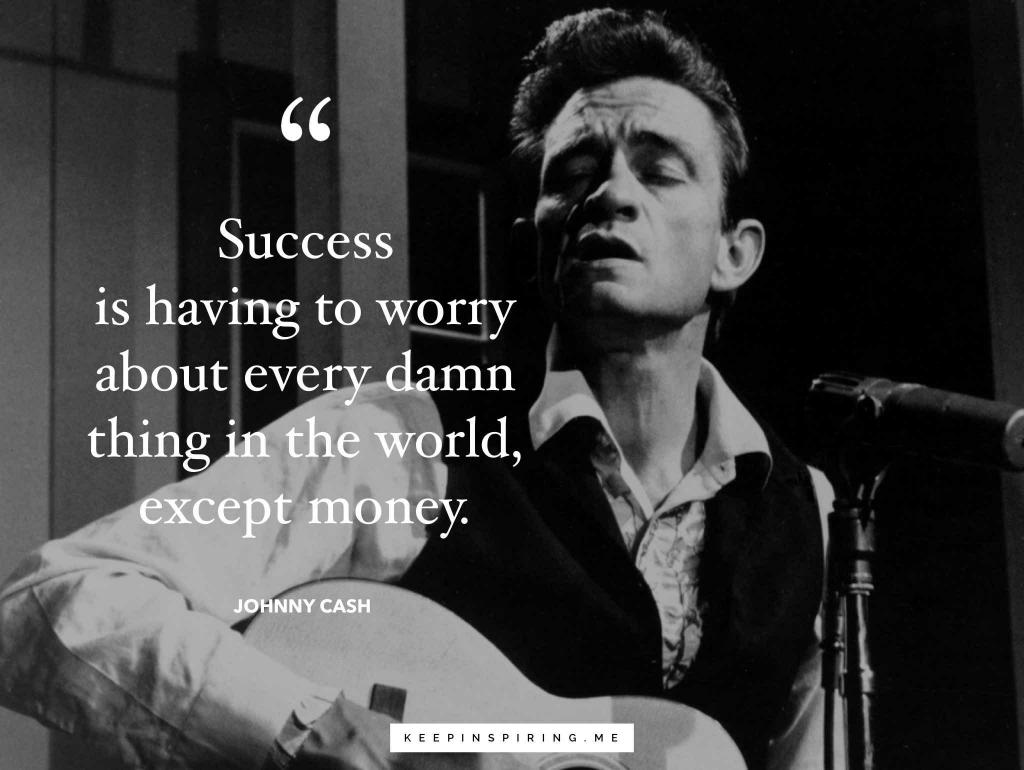

“Success is having to worry about every damn thing in the world, except money.” – Johnny Cash (image © Getty Images)
On Childhood
J.R. Cash was born on February 26, 1932, in Kingsland, Arkansas to Ray Cash and Carrie Cloveree (née Rivers). He was the fourth of seven children, 4 boys and 3 girls. When Cash was three years old, the family settled in Dyess, Arkansas, a “New Deal” colony that had been established to give poor families the opportunity to work land that they could later own.
From the age of five, he worked in the cotton fields with his family, singing with them as they worked. At home, J.R. and his siblings listened to gospel music and the radio.

![]()
On May 12, 1944, an accident occurred that was to change Johnny Cash’s life and outlook. His older brother Jack, with whom he was very close, was fatally injured at the high school he was working in. He was pulled into an unguarded table saw while cutting oak into fence posts, and was almost cut in two; he died from his injuries a week later.
In his autobiography, Cash spoke of the guilt he felt over this incident, as he, his mother, and even Jack himself all had a deep sense of foreboding about that particular day. His mother urged Jack to skip work and go fishing with his brother, but he insisted on working to bring the money home to his family.
The family’s personal and economic struggles during the Great Depression inspired many of Johnny Cash’s later songs, especially those about poor workers who were facing similar difficulties.
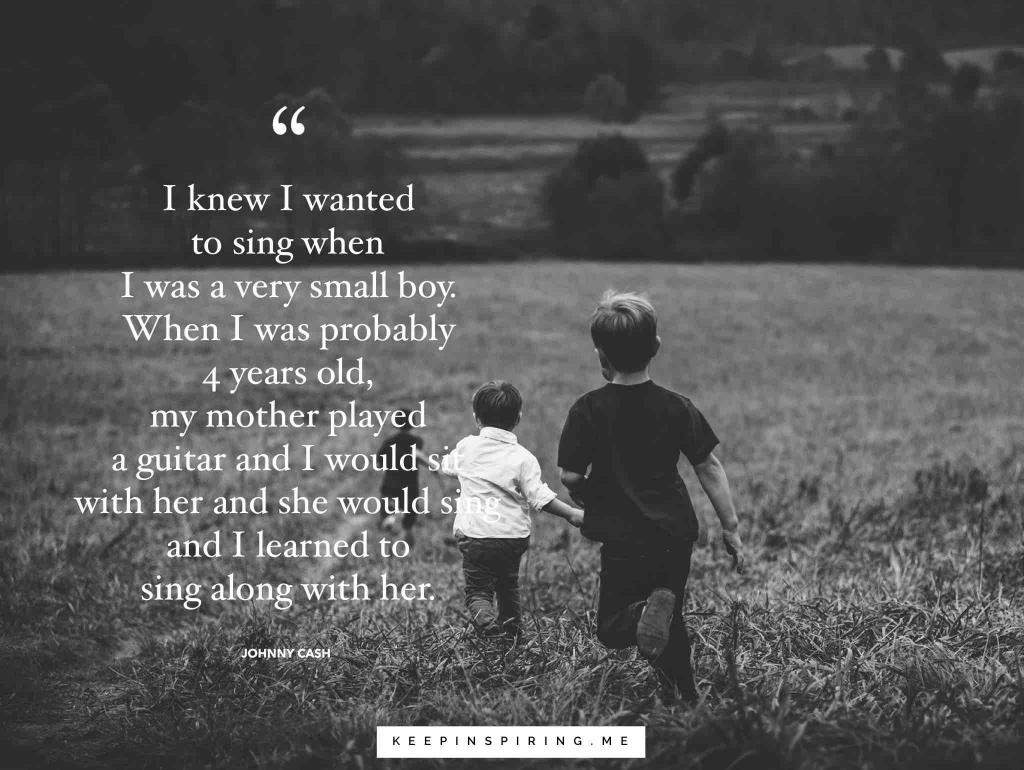

“I knew I wanted to sing when I was a very small boy. When I was probably 4 years old. My mother played a guitar and I would sit with her and she would sing and I learned to sing along with her.” – Johnny Cash
“You’ve got to know your limitations. I don’t know what your limitations are. I found out what mine were when I was twelve. I found out that there weren’t too many limitations, if I did it my way.”
“I found out that there weren’t too many limitations, if I did it my way.”
“I’m very shy really. I spend a lot of time in my room alone reading or writing or watching television.”
“That was the big thing when I was growing up, singing on the radio. The extent of my dream was to sing on the radio station in Memphis. Even when I got out of the Air Force in 1954, I came right back to Memphis and started knocking on doors at the radio station.”
“My father was a man of love. He always loved me to death. He worked hard in the fields, but my father never hit me. Never. I don’t ever remember a really cross, unkind word from my father.”
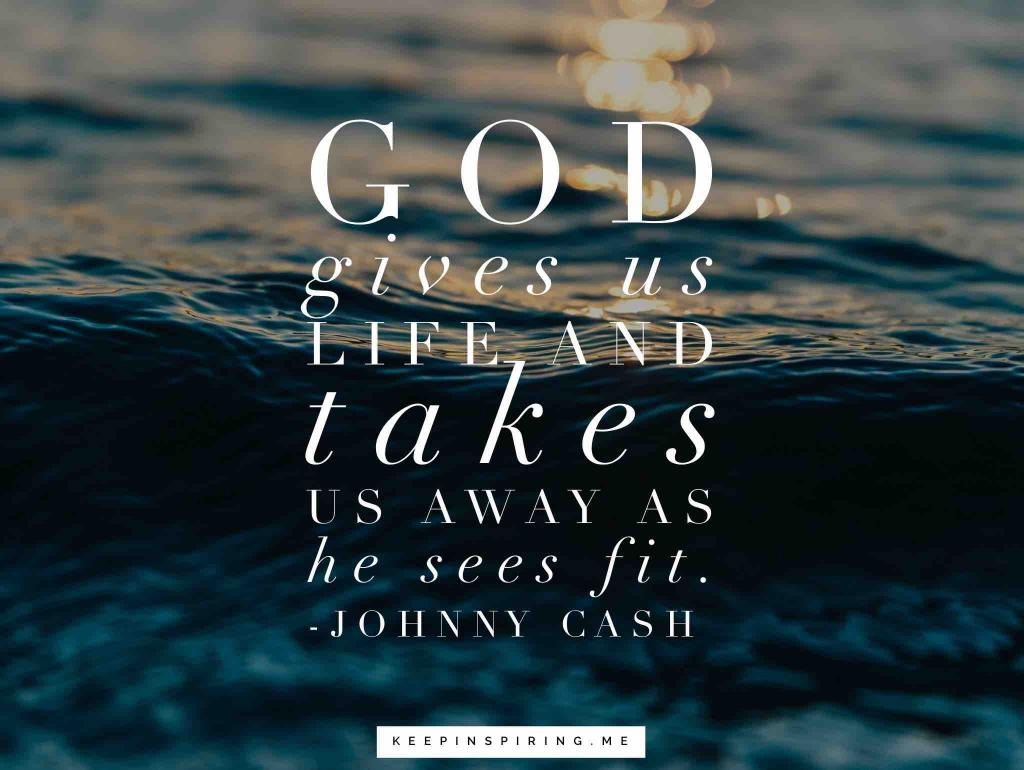

“God gives us life and takes us away as He sees fit.” – Johnny Cash
On Work
Cash enlisted in the United States Air Force on July 7, 1950. He did his basic training at Lackland Air Force Base and his technical training at Brooks Air Force Base, both in San Antonio, Texas. He was assigned to the 12th Radio Squadron Mobile of the U.S. Air Force Security Service in Germany, where he worked as a Morse code operator intercepting Soviet Army transmissions.
He was honorably discharged four years later, and returned to Texas. It was during his military service that he acquired the distinctive scar on the right side of his jaw as a result of surgery to remove a cyst.
Later that year (1954) Cash and his young wife Vivian moved to Memphis, Tennessee. He sold appliances while studying to be a radio announcer, playing with guitarist Luther Perkins and bassist Marshall Grant by night.
Cash worked up the courage to visit the Sun Records studio in hopes of a recording contract. But when he auditioned for Sam Phillips, singing mostly gospel songs, the producer told him that he no longer recorded gospel music.
Sam Phillips was rumored to have told Johnny Cash to “go home and sin, then come back with a song I can sell.” Cash eventually won over the producer with new songs delivered in his early rockabilly style. In 1955, Cash made his first recordings at Sun, “Hey Porter” and “Cry! Cry! Cry!”, which were released in late June and met with success on the country hit parade.
[embedded content]
[embedded content]
“This business I’m in is different. It’s special. The people around me feel like brothers and sisters. We hardly know each other, but we’re that close; somehow there’s been an immediate bonding between total strangers. We share each other’s triumphs, and when one of us gets hurt, we all bleed – it’s corny, I know, but it’s true. I’ve never experienced anything like this before. It’s great. It turns up the heat in life.”
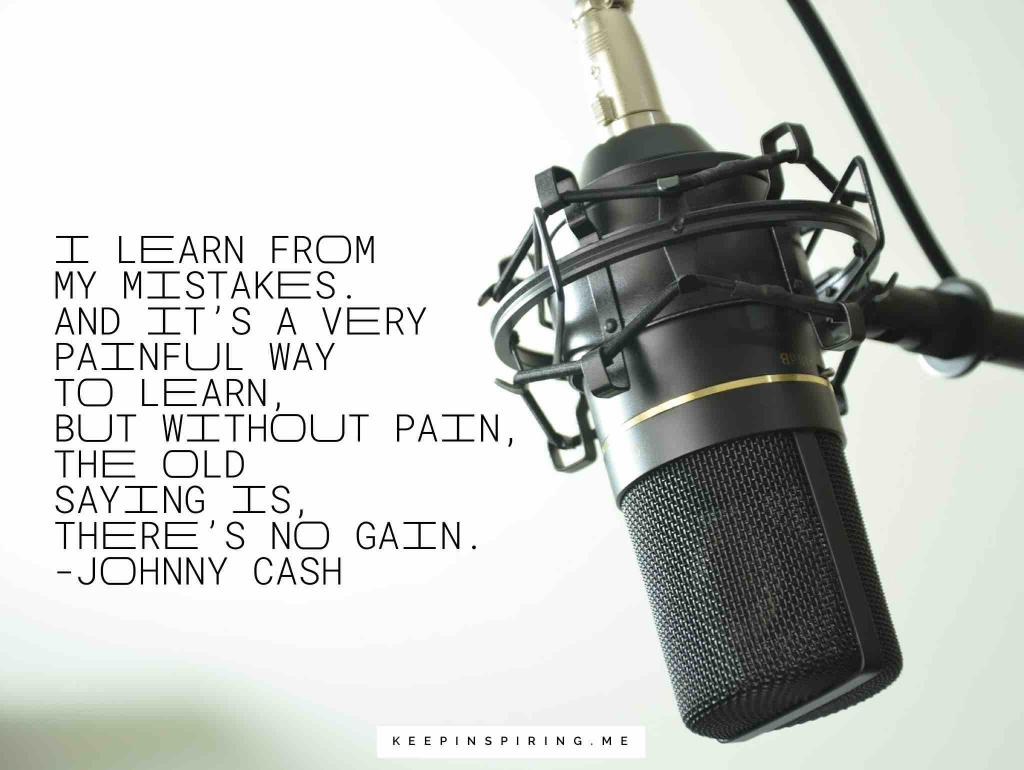

“I learn from my mistakes. It’s a very painful way to learn, but without pain, the old saying is, there’s no gain.” – Johnny Cash
“That was the big thing when I was growing up, singing on the radio. The extent of my dream was to sing on the radio station in Memphis. Even when I got out of the Air Force in 1954, I came right back to Memphis and started knocking on doors at the radio station.”
“You’ve got a song you’re singing from your gut, you want that audience to feel it in their gut. And you’ve got to make them think that you’re one of them sitting out there with them too. They’ve got to be able to relate to what you’re doing.”
“I took the easy way, and to an extent I regret that. Still, though, the way we did it was honest. We played it and sang it the way we felt it, and there’s a lot to be said for that.”
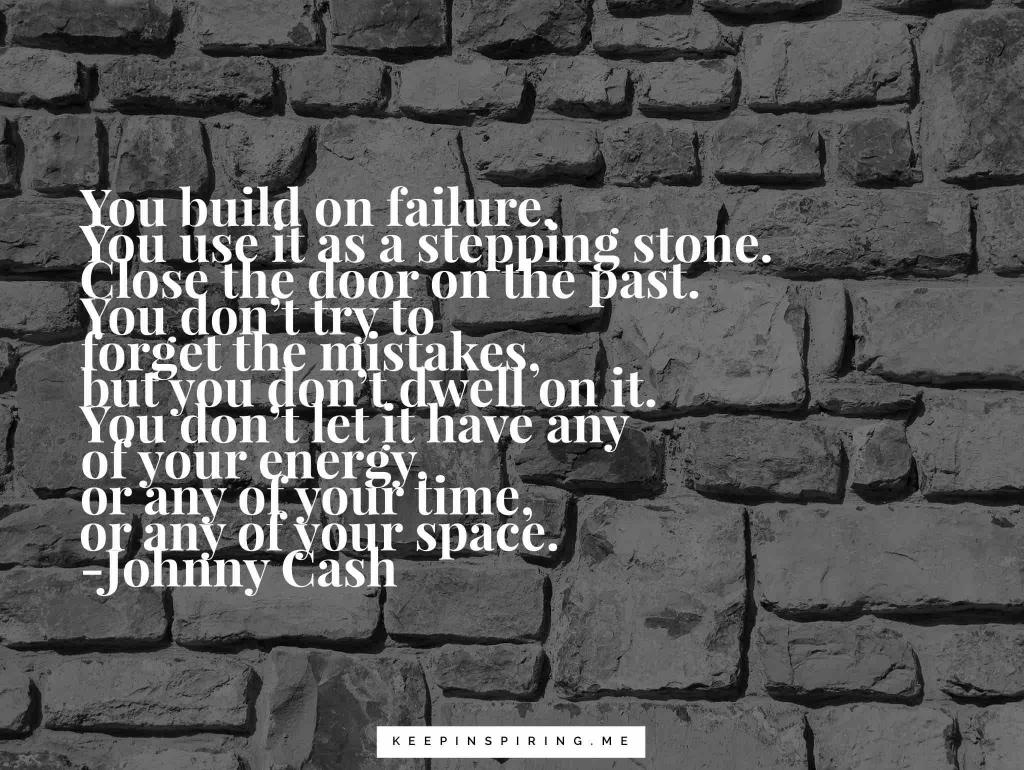

“You build on failure. You use it as a stepping stone. Close the door on the past. You don’t try to forget the mistakes, but you don’t dwell on it. You don’t let it have any of your energy, or any of your time, or any of your space.” – Johnny Cash
“People call me wild. Not really though, I’m not. I guess I’ve never been normal, not what you call Establishment. I’m country.”
“If you aren’t gonna say exactly how and what you feel, you might as well not say anything at all.”
“I love to go to the studio and stay there 10 or 12 hours a day. I love it. What is it? I don’t know. It’s life.”
“It’s like a novelist writing far out things. If it makes a point and makes sense, then people like to read that. But if it’s off in left field and goes over the edge, you lose it. The same with musical talent, I think.”
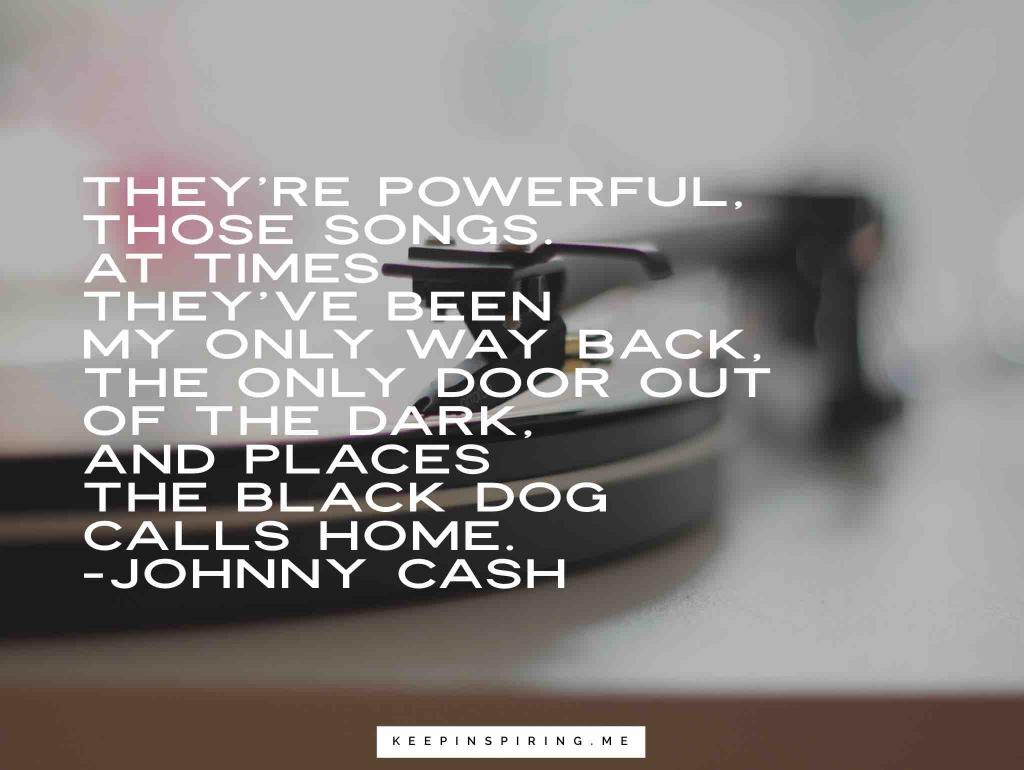

“They’re powerful, those songs. At times they’ve been my only way back, the only door out of the dark, bad places the black dog calls home.” – Johnny Cash
“The things that have always been important: to be a good man, to try to live my life the way God would have me, to turn it over to Him that His will might be worked in my life, to do my work without looking back, to give it all I’ve got, and to take pride in my work as an honest performer.”
“When I record somebody else’s song, I have to make it my own or it doesn’t feel right. I’ll say to myself, I wrote this and he doesn’t know it!”
“You have to be what you are. Whatever you are, you gotta be it.”
“Life is rough so you gotta be tough.”
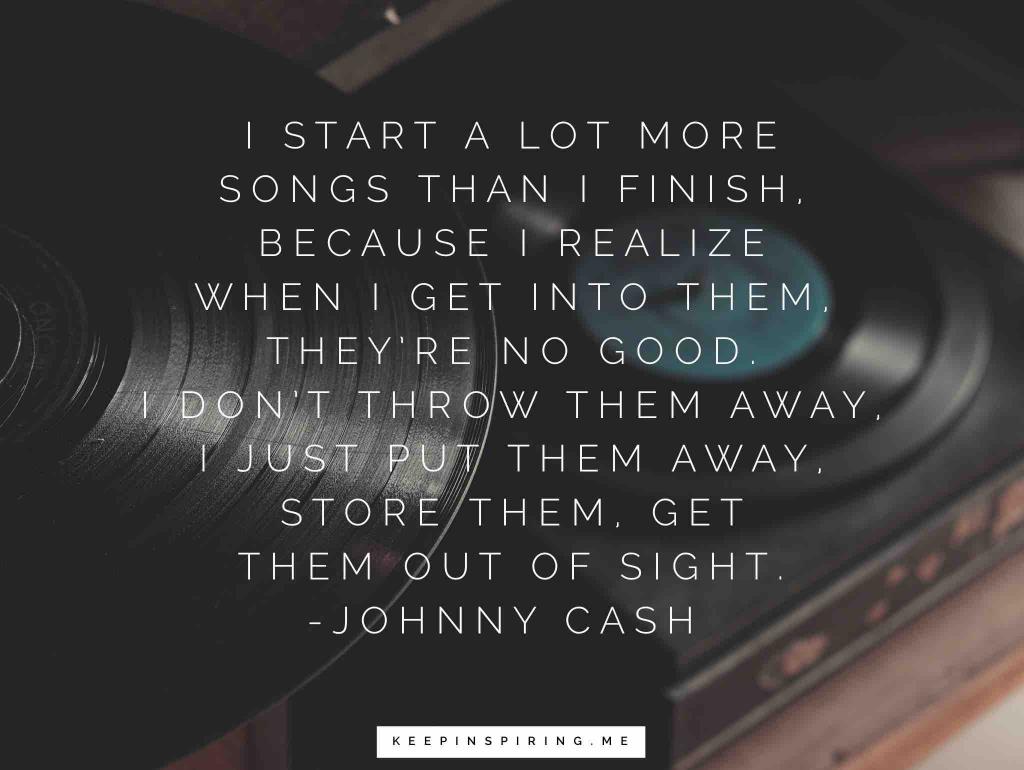

“I start a lot more songs than I finish, because I realize when I get into them, they’re no good. I don’t throw them away, I just put them away, store them, get them out of sight.” – Johnny Cash
On Life
1957 saw Cash bringing out the music for which he became most famous: “Folsom Prison Blues” and “I Walk the Line,” the latter becoming number one on the country charts and even crossed over into the pop chart. “Home of the Blues” followed and that same year, Cash became the first Sun artist to release a long-playing album.

![]()
Although he was Sun’s most consistently selling and prolific artist at that time, Cash felt constrained by his contract with the small label. Phillips did not want Cash to record gospel music at all, and was paying him a 3% royalty rather than the standard rate of 5%. In 1958, Cash followed in Elvis Presley’s footsteps and left Sun, signing a lucrative offer with Columbia Records.
His single “Don’t Take Your Guns to Town” became one of his biggest hits, and he was finally able to record a collection of gospel songs for his second album. When you hear the name Johnny Cash, Folsom Prison comes to mind. In the late fifties he started to perform concerts in California prisons like Folsom and San Quentin, which led to successful live recordings. Central to The Gift: The Journey of Johnny Cash documentary, which premiered at SXSW, these concerts propelled his fame to new heights.
[embedded content]
[embedded content]
As his career began to really take off, Cash started drinking heavily and became addicted to amphetamines and barbiturates. He briefly shared an apartment in Nashville with Waylon Jennings, whose own addiction fueled Cash’s.
He relied on stimulants to stay awake during tours, and though people turned a blind eye to his “nervousness” and erratic behavior, his drug addiction was worsening. It led to cancelled performances, and Cash was arrested seven times for misdemeanors.
In 1967, the singer was jailed for the night in LaFayette, Georgia. He was released after a long talk from Sheriff Ralph Jones, who warned him about the danger of his behavior and his wasted potential.
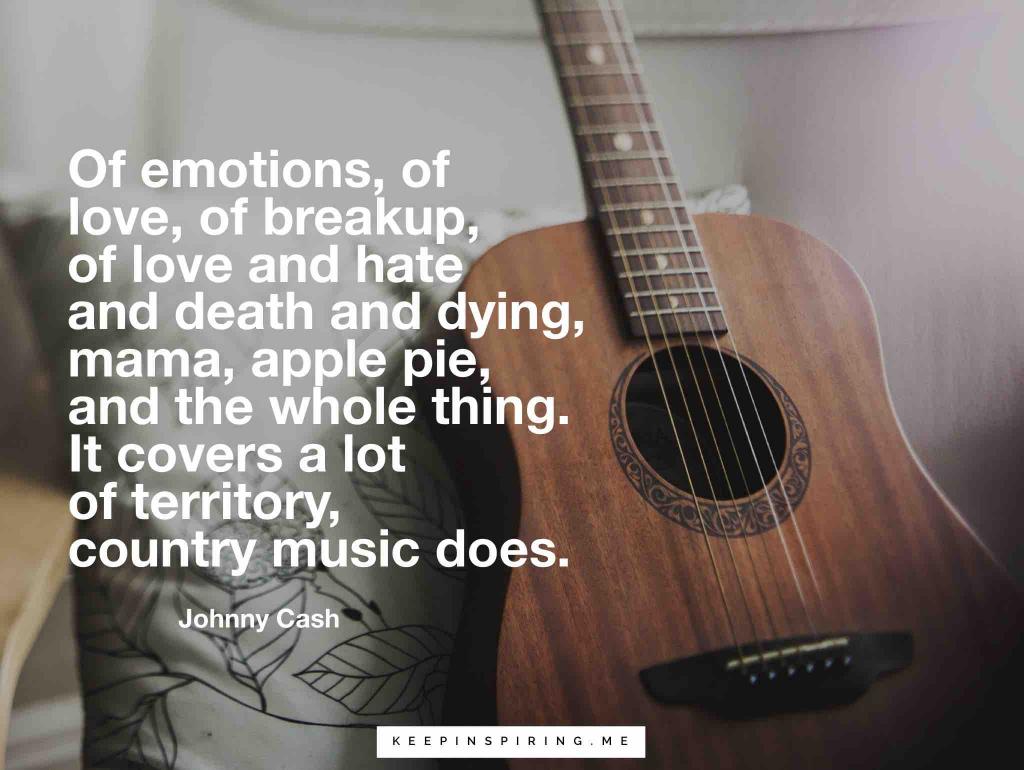

“Of emotions, of love, of breakup, of love and hate and death and dying, mama, apple pie, and the whole thing. It covers a lot of territory, country music does.” – Johnny Cash
“If this were a movie I’d be the bad guy.”
“There’s a lot of things blamed on me that never happened. But then, there’s a lot of things that I did that I never got caught at.”
“Beneath the stains of time the feeling disappears, you are someone else I am still right here.”
“There’s no more simple life with simple choices for the young.”
“However, neither he nor anyone else could have become the star Elvis was. Ain’t nobody like Elvis. Never was.”
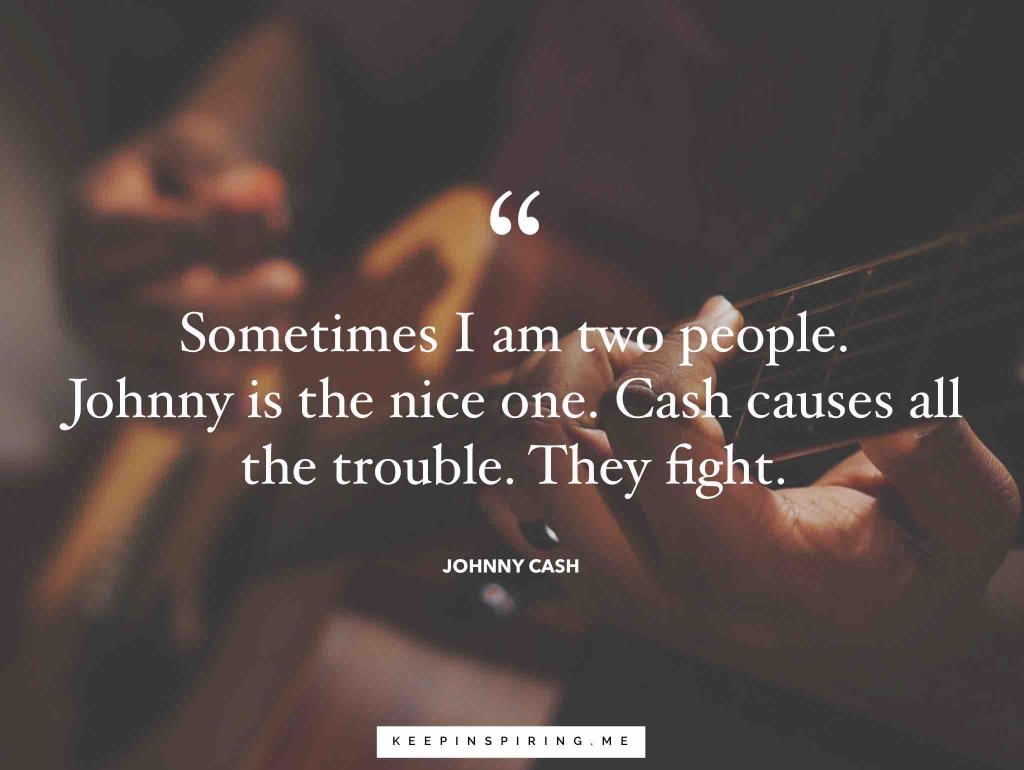

“Sometimes I am two people. Johnny is the nice one. Cash causes all the trouble. They fight.” – Johnny Cash
“Somehow there’s been an immediate bonding between total strangers. We share each other’s triumphs, and when one of us gets hurt, we all bleed – it’s corny, I know, but it’s true.”
“We’re all in this together if we’re in it at all.”
“You miss a lot of opportunities by making mistakes, but that’s part of it: knowing that you’re not shut out forever, and that there’s a goal you still can reach.”
“The ones that you’re calling wild are going to be the leaders in a little while.”
“I’m not bitter. Why should I be bitter? I’m thrilled to death with life.”
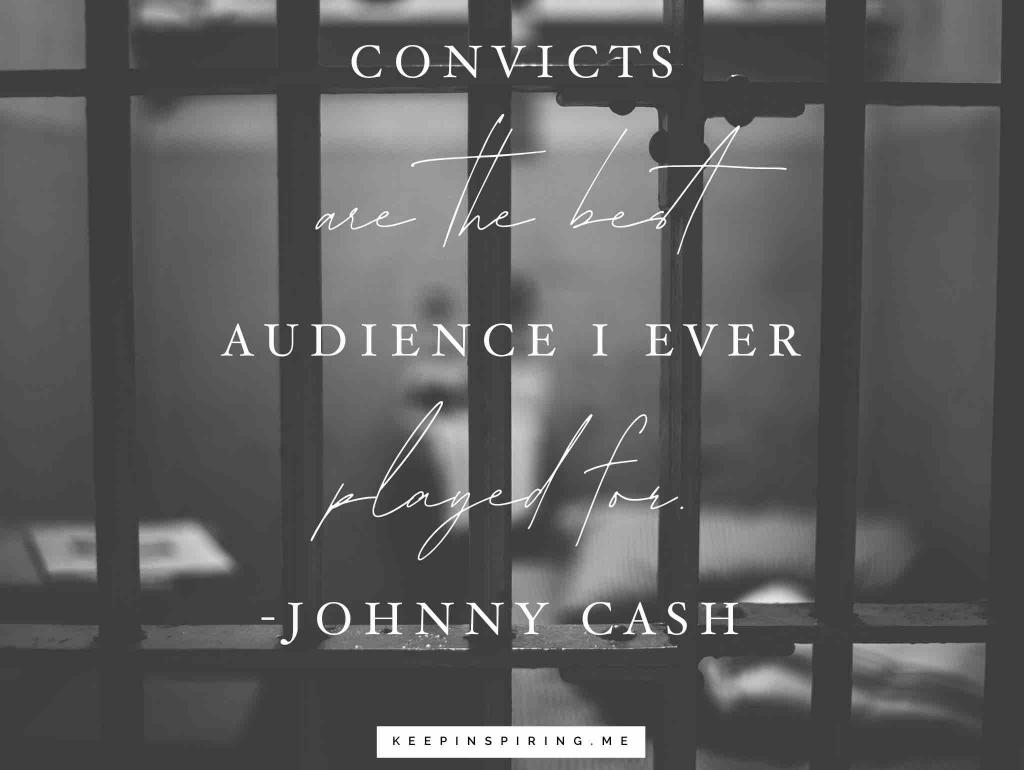

“Convicts are the best audience I ever played for.” – Johnny Cash
“I love weather. I’m a connoisseur of weather. Wherever my travels take me, the first thing I do is turn on the weather channel and see what’s going on, what’s coming. I like to know about regional weather patterns, how storms are created in different altitudes, what kinds of clouds are forming or dissipating or blowing through, where the winds are coming from, where they’ve been. That’s not a passion everybody shares, I know, but I don’t believe there are any people on earth who, properly sheltered, don’t feel the peace inside a summer rain and the cleansing it brings, the renewal of the earth in its aftermath.”
“If you aren’t gonna say exactly how and what you feel, you might as well not say anything at all.”
“Money can’t buy back your youth when you’re old, a friend when you’re lonely, or peace to your soul.”
“It’s good to know who hates you and it is good to be hated by the right people.”
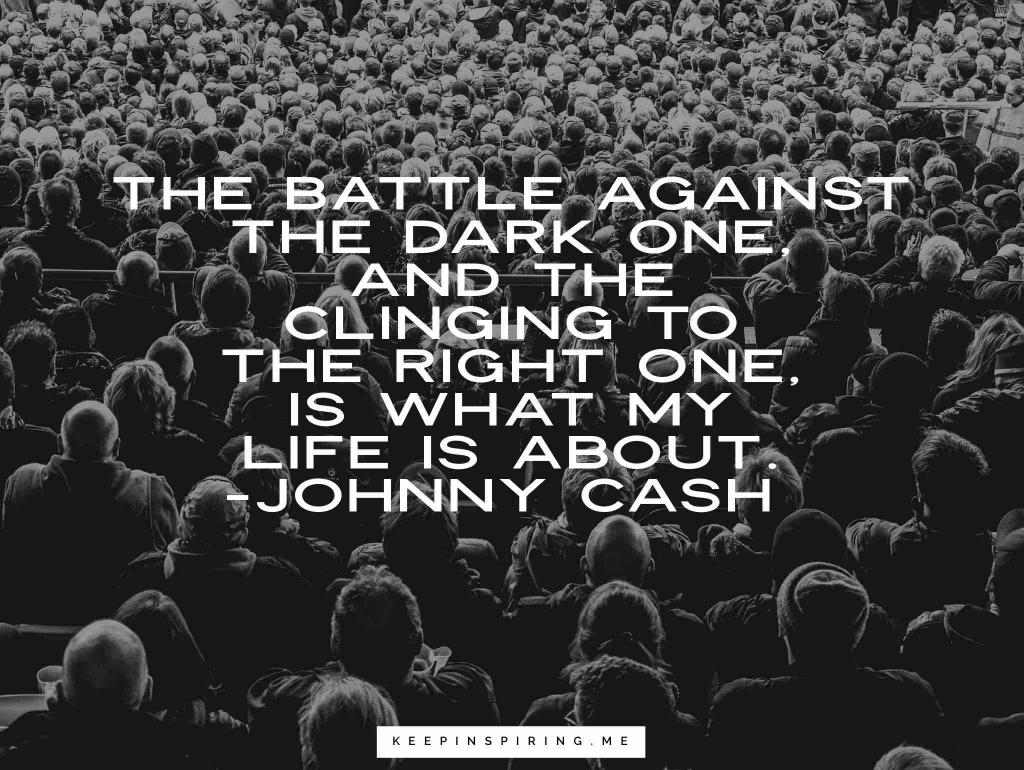

“The battle against the dark one, and the clinging to the right one, is what my life is about.” – Johnny Cash
“A rose looks grey at midnight, but the flame is just asleep. And steel is strong because it knows the hammer and white heat.”
“You can ask the people around me. I don’t give up. I don’t give up… and it’s not out of frustration and desperation that I say I don’t give up. I don’t give up because I don’t give up. I don’t believe in it.”
“It makes me so mad that some people underestimate the wisdom and energy of young people. All because they don’t look the way older folks think they should look. I’m working on a song about it. Maybe some of those closed minded people will realize long hair and tattoos don’t mean they should be ignored. Close minded people are part of what’s wrong with this world.”
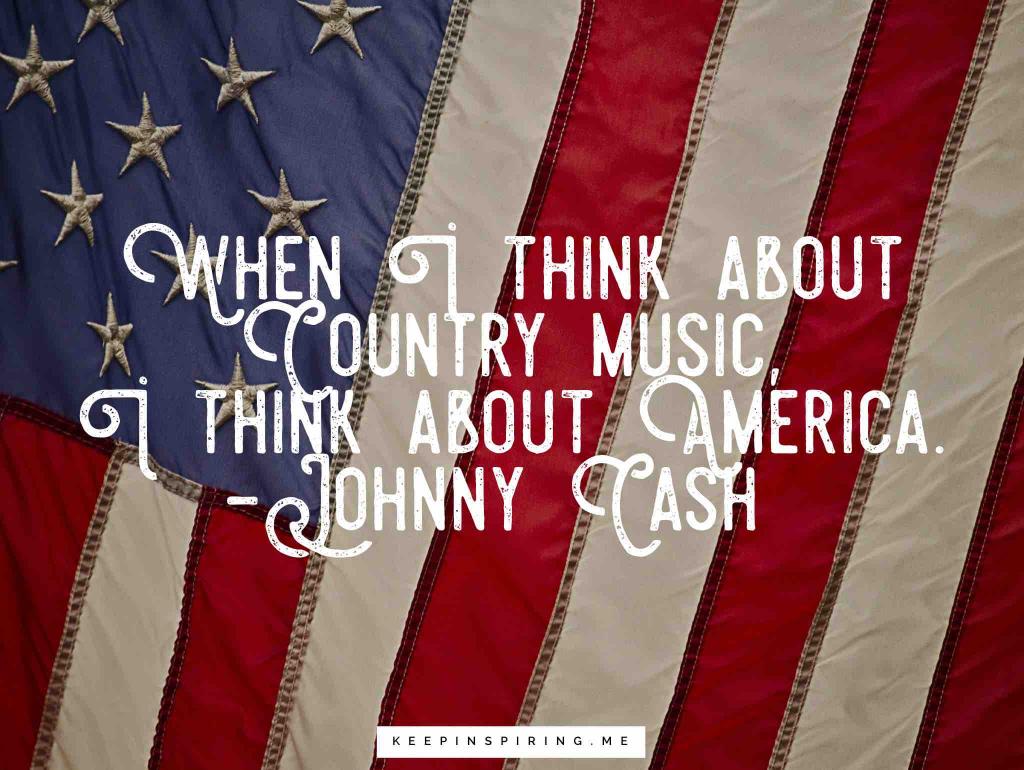

“When I think about country music, I think about America.” – Johnny Cash
“I love the freedoms we got in this country, I appreciate your freedom to burn your flag if you want to, but I really appreciate my right to bear arms so I can shoot you if you try to burn mine.”
On Love
Johnny Cash had met Vivian Liberto in San Antonio in July 1951, just before his 3-year deployment to Germany. They married a month after his discharge, and had four daughters: Rosanne, Kathy, Cindy, and Tara. Liberto filed for divorce in 1966, stating Cash’s serious drug and alcohol abuse, constant touring, and affairs with other women, as reasons. She then raised the couple’s four daughters alone.
Cash met the love of his life, singer June Carter, while he was on tour. The two became absolutely infatuated with each other, despite the fact that they were both married to other people (and Johnny’s continued addiction issues). In 1968, 13 years after they first met, Cash proposed to June during a live performance in London, Ontario. They married on March 1, 1968, in Franklin, Kentucky and went on to have one child together, John Carter Cash, who was born March 3, 1970.
Johnny Cash and June Carter Cash continued to work, raise their child, create music, and tour together for 35 more years, until June died in May 2003. Cash stated that he believed that his only reason for living was his music. He passed away just four months after she did, on 12 September 2003.
Their great love story is central to the 2005 biographical movie Walk the Line, starring Joaquin Phoenix and Reese Witherspoon as Johnny and June.
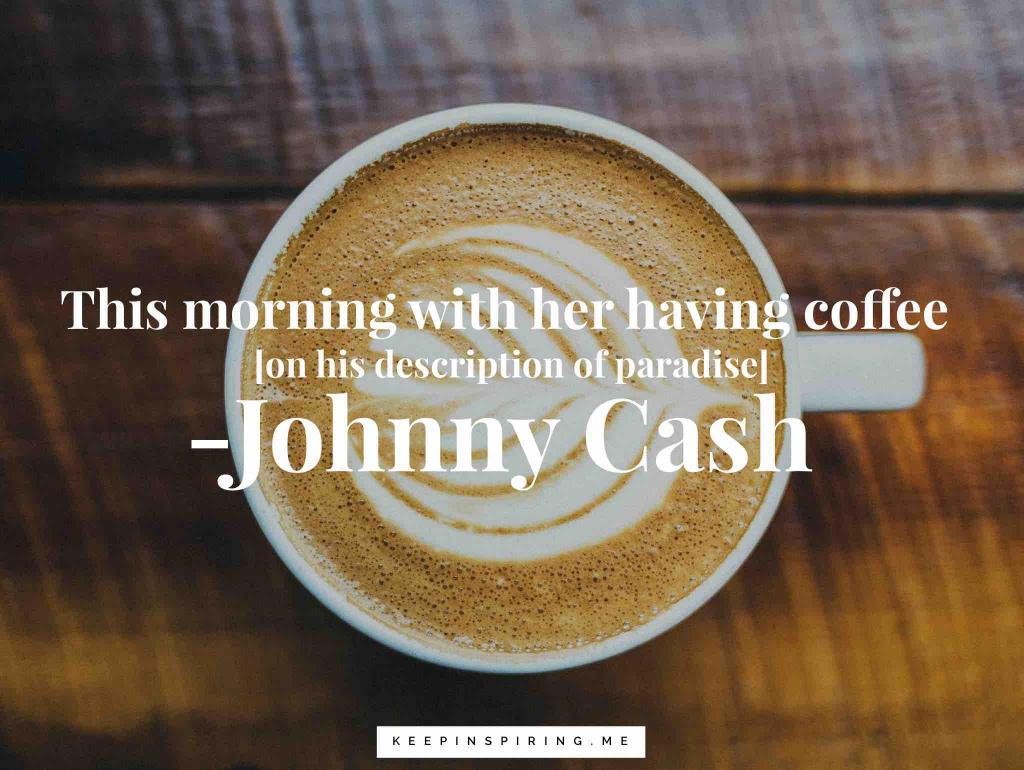

“This morning, with her, having coffee. [his description of paradise]” – Johnny Cash
“For you I know I’d even try to turn the tide.”
“Happiness is being at peace, being with loved ones, being comfortable…but most of all, it’s having those loved ones.”
“There’s unconditional love there. You hear that phrase a lot but it’s real with me and her [June Carter]. She loves me in spite of everything, in spite of myself. She has saved my life more than once. She’s always been there with her love, and it has certainly made me forget the pain for a long time, many times. When it gets dark and everybody’s gone home and the lights are turned off, it’s just me and her.”
“When my wife died, I booked myself into the studio just to work, to occupy myself.”
“Backstage at the Grand Ole Opry, I got on my knees and told her that I was going to marry her some day. We were both married to someone else at the time. ‘Ring Of Fire’ — June and Merle Kilgore wrote that song for me – that’s the way our love affair was. We fell madly in love and we worked together all the time, toured together all the time, and when the tour was over we both had to go home to other people. It hurt.”
“Flesh and blood needs flesh and blood, and you’re the one I need.”
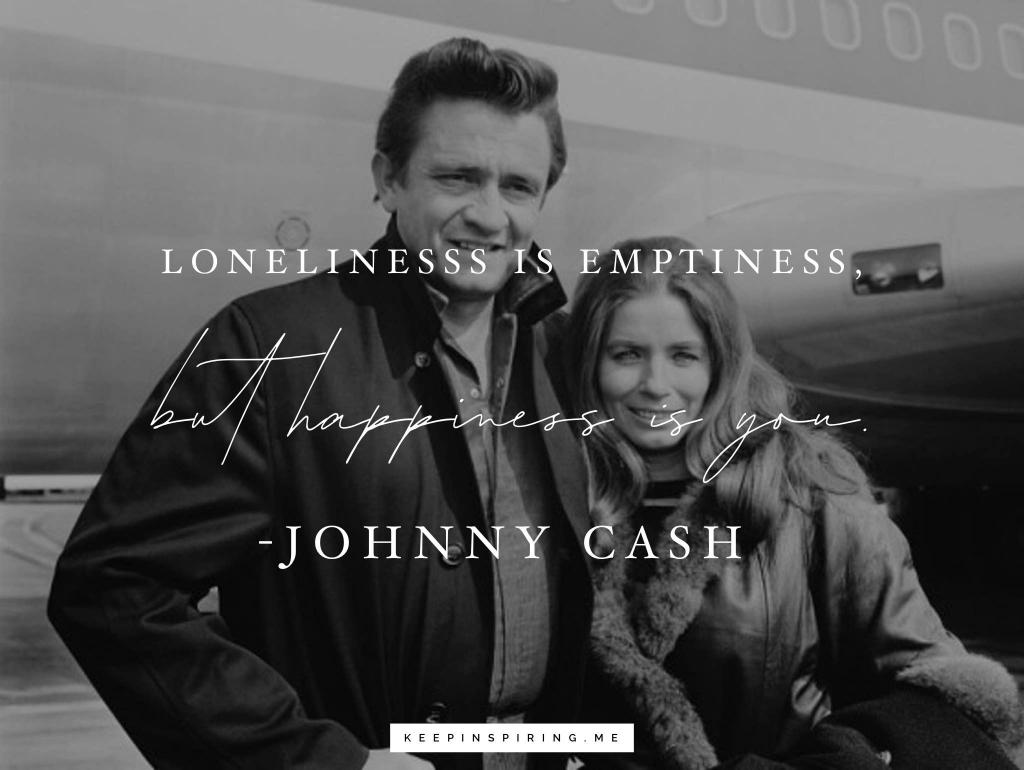

“Loneliness is emptiness, but happiness is you.” – Johnny Cash image © George Stroud/Stringer, Getty Images
“She’s the greatest woman I have ever known. Nobody else, except my mother, comes close.”
“There’s no way around grief and loss: you can dodge all you want, but sooner or later you just have to go into it, through it, and, hopefully, come out the other side. The world you find there will never be the same as the world you left.”
“I’m not really concerned about boundaries. I just follow my conscience and my heart. Follow your heart. That’s what I do. Compassion is something I have a lot of, because I’ve been through a lot of pain in my life. Anybody who has suffered a lot of pain has a lot of compassion.”
“Life and love go on, let the music play.”
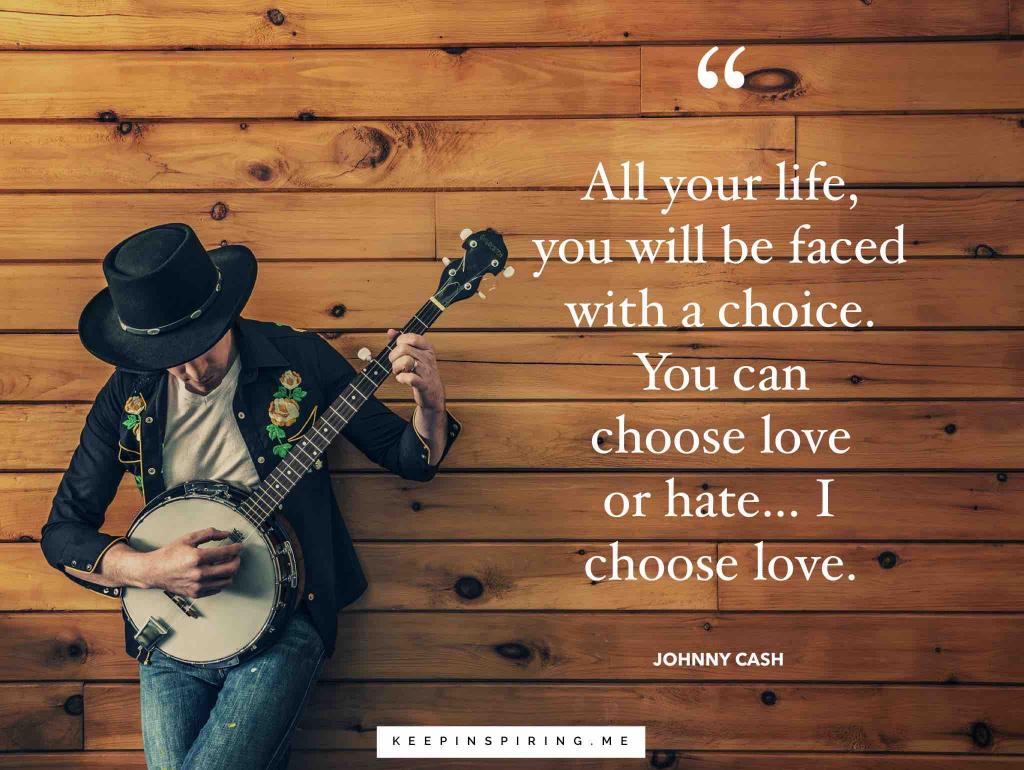

“All your life, you will be faced with a choice. You can choose love or hate…I choose love.” – Johnny Cash
“The spirit of June Carter overshadows me tonight with the love she had for me and the love I have for her. We connect somewhere between here and Heaven. She came down for a short visit, I guess, from Heaven to visit with me tonight to give me courage and inspiration like she always has. She’s never been one for me except courage and inspiration. I thank God for June Carter. I love her with all my heart.”
On Faith
Early in 1967, Cash had a spiritual epiphany in the Nickajack Cave. Cash, under the influence of drugs, supposedly attempted to commit suicide. He descended into the cave, trying to lose himself and “just die,” but instead passed out on the floor.
There he felt God’s presence in his heart and followed a faint light and slight breeze out of the cave to safety. To him, the incident represented a rebirth – a second chance.
June and her parents Maybelle and Ezra moved into Cash’s mansion for a month to help him get off drugs. It took time for him to break his addictions to drugs, but June, their son John Carter Cash, and his faith, ultimately helped Johnny Cash to get back to life on the straight and narrow. He also developed a friendship with Billy Graham, and was inspired to produce a film about Jesus’ life.
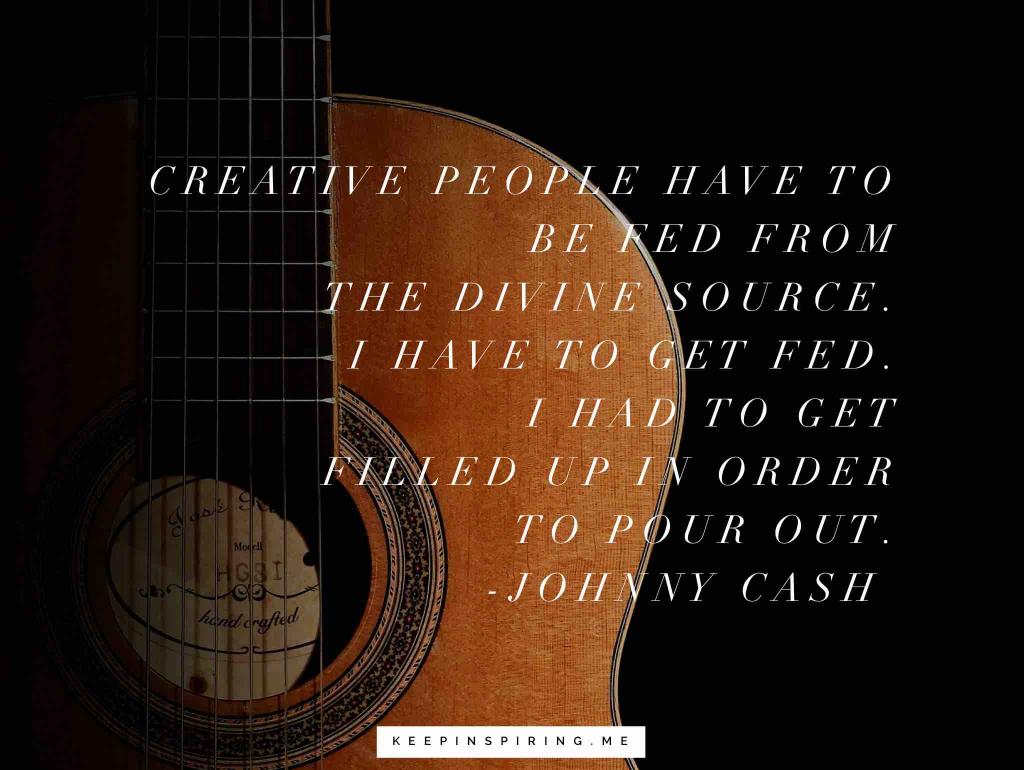

“Creative people have to be fed from the divine source. I have to get fed. I had to get filled up in order to pour out.” – Johnny Cash
“I don’t have Paul’s calling – I’m not out there being all things to all men to win them for Christ – but sometimes I can be a signpost. Sometimes I can sow a seed. And post-hole diggers and seed sowers are mighty important in the building of the Kingdom.”
“If you don’t get outside every day, even for a minute, you have not appreciated what God has done. It makes you grateful for our surroundings, and it starts your day differently.”
“No matter how much you’ve sinned, no matter how much you’ve stumbled, no matter how much you fall, no matter how far you’ve got from God, don’t give up. You can still be redeemed. As someone says, keep the faith.”
“Life is the question and life is the answer, and God is the reason and love is the way.”
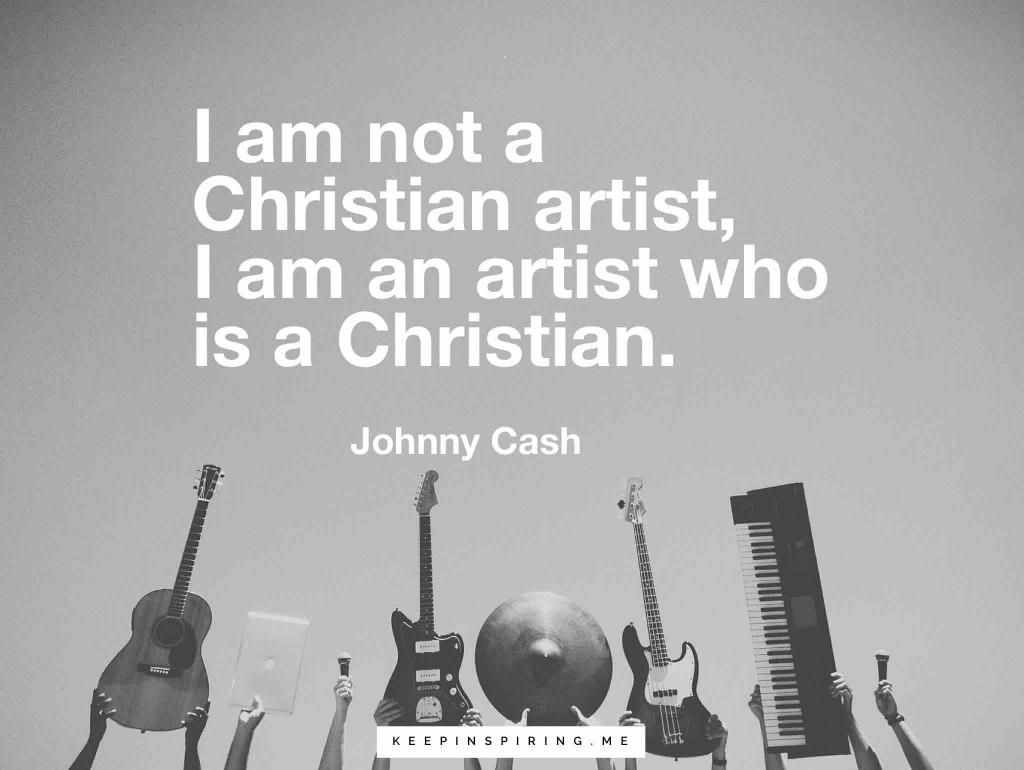

“I am not a Christian artist, I am an artist who is a Christian.” – Johnny Cash
“I read novels but I also read the Bible. And study it, you know? And the more I learn, the more excited I get.”
“We’ll all be equal under the grass, and God’s got a heaven for country trash.”
“God’s the final judge for Elvis Presley and Johnny Cash too. That’s solely in the hands of God.”
“I have tried drugs and a little of everything else, and there iss nothing in the world more soul-satisfying than having the kingdom of God building inside you and growing.”
“I love songs about horses, railroads, land, Judgment Day, family, hard times, whiskey, courtship, marriage, adultery, separation, murder, war, prison, rambling, damnation, home, salvation, death, pride, humor, piety, rebellion, patriotism, larceny, determination, tragedy, rowdiness, heartbreak and love. And Mother. And God.”
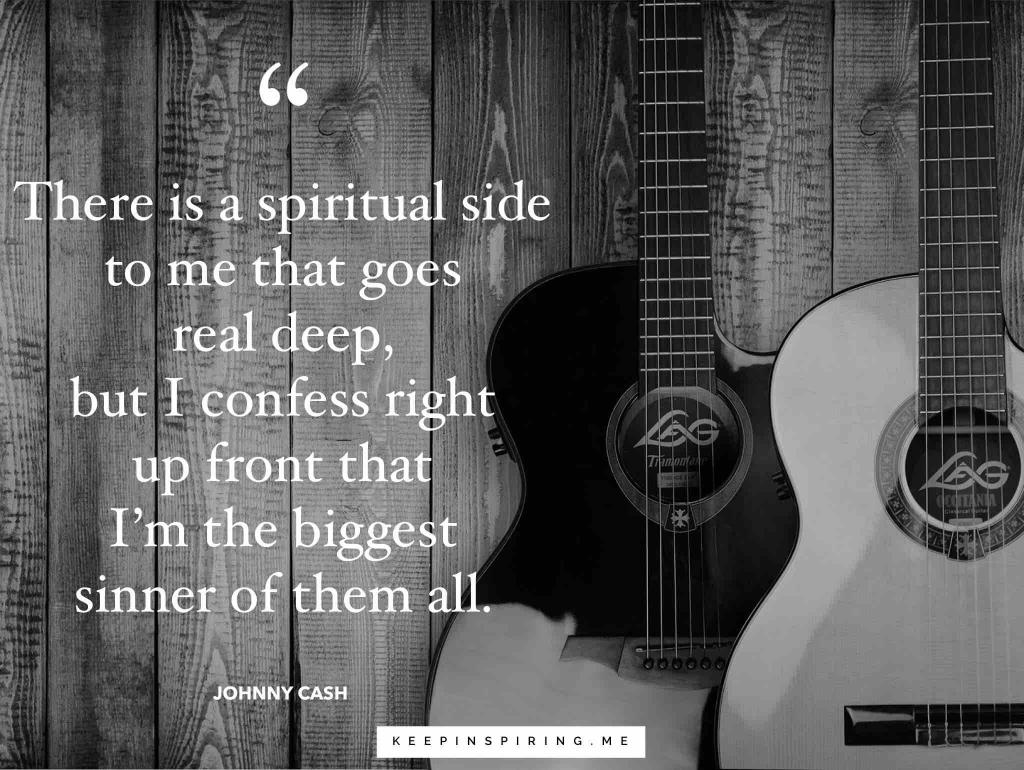

“There is a spiritual side to me that goes real deep, but I confess right up front that I’m the biggest sinner of them all.” – Johnny Cash
“How well I have learned that there is no fence to sit on between heaven and hell. There is a deep, wide gulf, a chasm, and in that chasm is no place for any man.”
“The Master of Life been good to me. He has given me strength to face past illnesses, and victory in the face of defeat. He has given me life and joy where other saw oblivion. He Has given new purpose to live for, new services to render and old wounds to heal. Life and love go on, let the music play.”
“My arms are too short to box with God.”
“The gospel of Christ must always be an open door with a welcome sign for all.”
“Jesus will not fail me, I shall not be moved.”
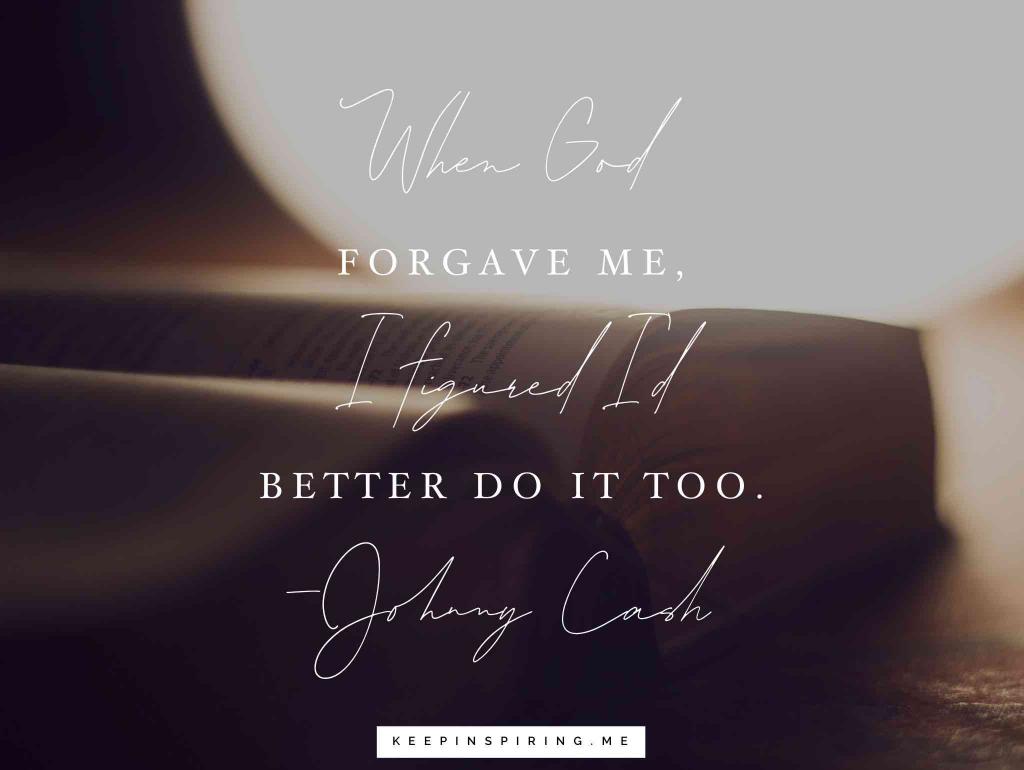

“When God forgave me, I figured I’d better do it too.” – Johnny Cash
On Being ‘The Man in Black’
Early in his career, Cash was given the nickname “the Undertaker” by fellow artists because he had a habit of wearing black clothes. He said he chose them because they were easier to keep looking clean when performing every night on long tours; and it was also the only color that he and his bandmates all had in their traveling wardrobe.
By 1970, the image of Johnny Cash as ‘The Man in Black’ was fully formed. In contrast with the rhinestone suits and cowboy boots worn by other major country acts, Cash stood out for performing dressed all in black, wearing a long, black, knee-length coat. He is also known to have said that he wore black for the poor and the hungry, in honor of the prisoner who had paid for his crime, and in mourning for the lives lost by Americans in the Vietnam War.
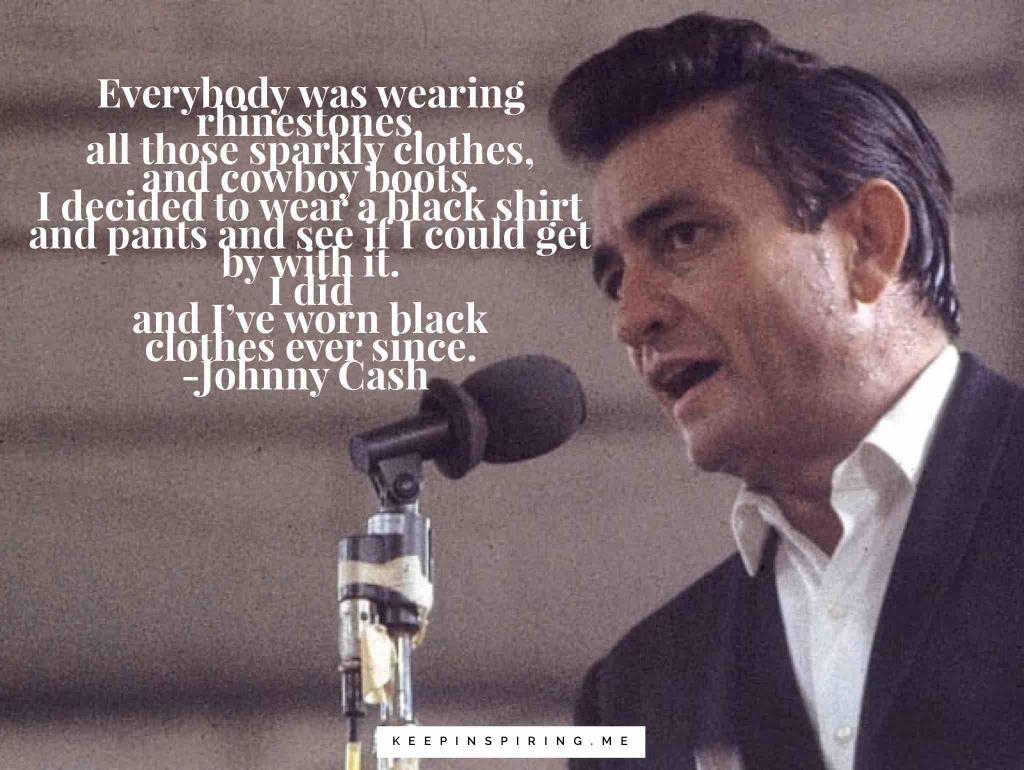

“Everybody was wearing rhinestones, all those sparkly clothes, and cowboy boots. I decided to wear a black shirt and pants and see if I could get by with it. I did and I’ve worn black clothes ever since.” – Johnny Cash Image © Dan Poush/AP Photo
“I wear black because I’m comfortable in it. But then in the summertime when it’s hot I’m comfortable in light blue.”
“I was wearing black clothes almost from the beginning. I feel comfortable in black. I felt like black looked good onstage, that it was attractive, so I started wearing it all the time.”
“I wore black because I liked it. I still do, and wearing it still means something to me. It’s still my symbol of rebellion — against a stagnant status quo, against our hypocritical houses of God, against people whose minds are closed to others’ ideas.”
“I wear the black for the poor and the beaten down, Livin’ in the hopeless, hungry side of town, I wear it for the prisoner who has long paid for his crime, But is there because he’s a victim of the times. I wear the black for those who never read.”
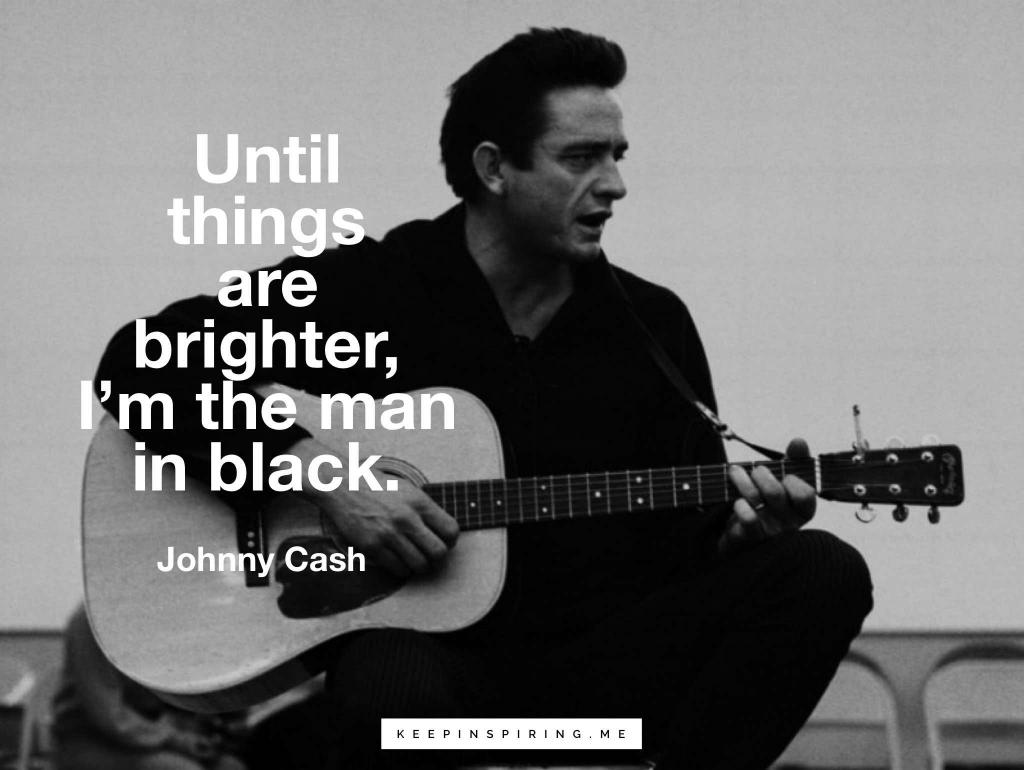

“Until things are brighter, I’m the man in black.” – Johnny Cash (image © Getty Images)
10 Johnny Cash Facts
1. According to his son John Carter Cash, Johnny Cash’s favorite books were The Bible, Gary Jenning’s Aztec, Og Mandino’s Greatest Salesman in the World, and Khalil Gibran’s The Prophet.
2. He bought his first guitar in Öberammergau, Germany, while in the US Air Force.
3. Cash became an ordained minister, and presided over the wedding of his daughter Karen.
4. He didn’t write his most famous song. “Ring of Fire” was written by June Carter and Merle Kilgore, and was actually released first by June’s sister Anita Carter. Cash made it his own by adding the Mariachi horns.
5. During a hotel stay in the 1950s, Cash and his bandmates let 500 baby chicks loose.
6. Johnny Cash was a campaigner for Native American rights. In 1966, the Seneca Nation’s Turtle Clan adopted Cash for his activism.
7. He released an incredible 96 albums and 170 singles over a career that spanned from 1954 to 2003.
8. Cash wrote two autobiographies, decades apart. Man in Black was written in 1975, and Cash: The Autobiography in 1997.
9. A species of tarantula in Folsom, CA is named after him: the “Aphonopelma johnnycashi.”
10. Only two people have been inducted into to the Songwriter’s Hall of Fame, the Rock and Roll Hall of Fame and the Country Music Hall of Fame: Hank Williams and Johnny Cash.
Bonus Fact: The opening montage of Zack Snyder’s 2004 remake of Dawn of the Dead is set to Cash’s iconic song, The Man Comes Around.
Did we forget any of your favorite Johnny Cash Quotes? Let us know or submit your favorite and stay inspired!